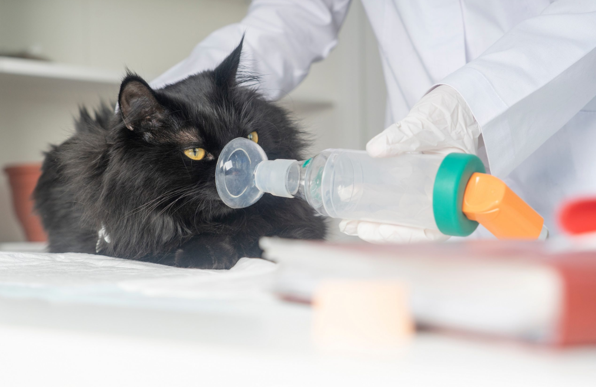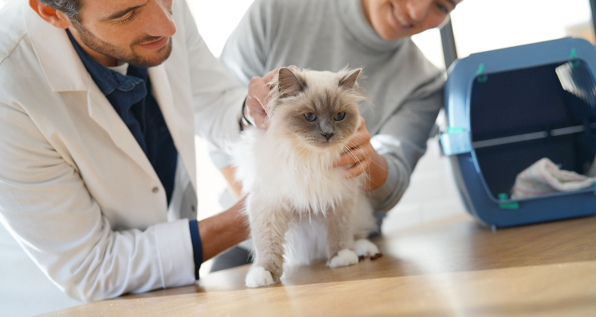Delving into Feline Asthma: An Introduction
Coping with asthma in cats can prove to be an arduous journey for pet guardians, often leaving us grappling with feelings of powerlessness as we witness our cherished feline companions wrestling with respiratory issues. But could there be a more natural solution to this problem? Let’s venture into the world of holistic treatment options for feline asthma.
A Closer Look at Asthma in Felines
What Constitutes Asthma?

Asthma is a long-term inflammation of the respiratory pathways that complicates breathing, culminating in symptoms such as coughing, wheezing, and expedited breathing. Asthma is not confined to humans and is quite widespread among cats.
Recognizing Asthma Symptoms in Cats
The initial step in diagnosing feline asthma is understanding the signs. These encompass rapid respiration, chronic coughing, wheezing, and strenuous efforts to breathe. An altered pattern in your cat’s behavior might serve as a clue too.
What Triggers Asthma in Cats?
Environmental Influences
Asthmatic attacks in cats can be instigated by environmental irritants like smoke, dust, molds, and harsh cleaning chemicals.
Genetic Factors
Certain cats might be genetically inclined to suffer from asthma, implying that this disorder can be prevalent in cat lineages.
Detecting Asthma in Cats
Seeking Veterinary Advice
Should you observe any signs of asthma in your cat, consult with your veterinarian. They’ll inquire about your cat’s health history and carry out an extensive physical evaluation.
Diagnostic Procedures
To corroborate the diagnosis of asthma, diagnostic procedures such as X-ray imaging and blood tests might be required.
Traditional Remedies for Feline Asthma
Prescribed Medication
Traditional treatment strategies often incorporate medications like corticosteroids and bronchodilators.
Use of Inhalers
Inhalers, akin to those used by human asthma patients, can also be suggested for cats with asthma.
Embracing Natural Remedies for Feline Asthma
The Value of Natural Interventions
Why should one contemplate natural remedies for feline asthma? Holistic treatments can function as a beneficial supplement to conventional medication, mitigating the risk of adverse effects.
Alterations in Lifestyle
Dodging environmental catalysts and guaranteeing your cat receives ample exercise can aid in controlling symptoms.
Herbal Solutions
Certain herbs, such as licorice root and mullein, may alleviate the inflammation in your cat’s airways.
Modifications in Diet
Feeding your cat a diet rich in omega-3 fatty acids might lessen inflammation and assist in managing asthma symptoms.
See Also: 11 Tips and Antispasmodic Home Remedies For Muscle Cramps
Points to Consider and Precautions to Take
Tracking Your Cat’s Reaction
It’s important to observe your cat’s reaction to any holistic intervention, as not every remedy is effective for every cat.
Veterinary Consultation
Remember, it’s essential to seek your vet’s advice prior to embarking on any natural treatment regimen. ‘Natural’ does not always translate to ‘safe.’
Wrapping Up
Holistic remedies for feline asthma can offer relief and enhance your cat’s overall well-being. However, these should serve as a supplementary strategy to conventional treatments, and not as a replacement. A consultation with a vet should always precede the trial of any holistic therapy.
Commonly Asked Questions
Can cats lead a normal life even with asthma?
Yes, with appropriate management, asthmatic cats can lead a normal, joyful life.
What provokes asthma in cats?
Asthma triggers can encompass environmental irritants like smoke, dust, and certain harsh cleaning chemicals.
Can altering my cat’s diet aid in controlling its asthma?
A diet abundant in omega-3 fatty acids may assist in decreasing the inflammation related to asthma.
Are there any adverse effects of holistic asthma treatments?
While holistic treatments generally exhibit fewer side effects, it’s imperative to consult with a vet before initiating any new treatment plan.
How soon can I anticipate improvements in my cat’s health with holistic treatments?
Outcomes can differ based on the specific intervention and the individual cat. Patience is key, and it’s vital to closely monitor your cat’s reaction.








